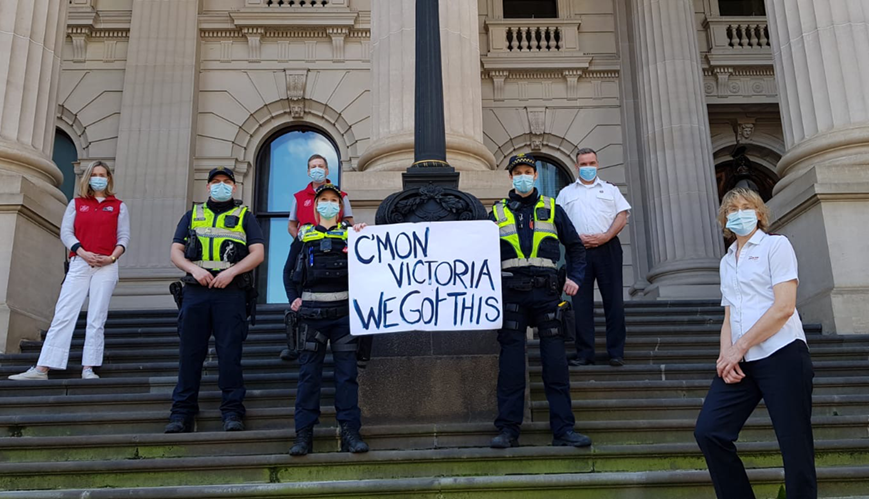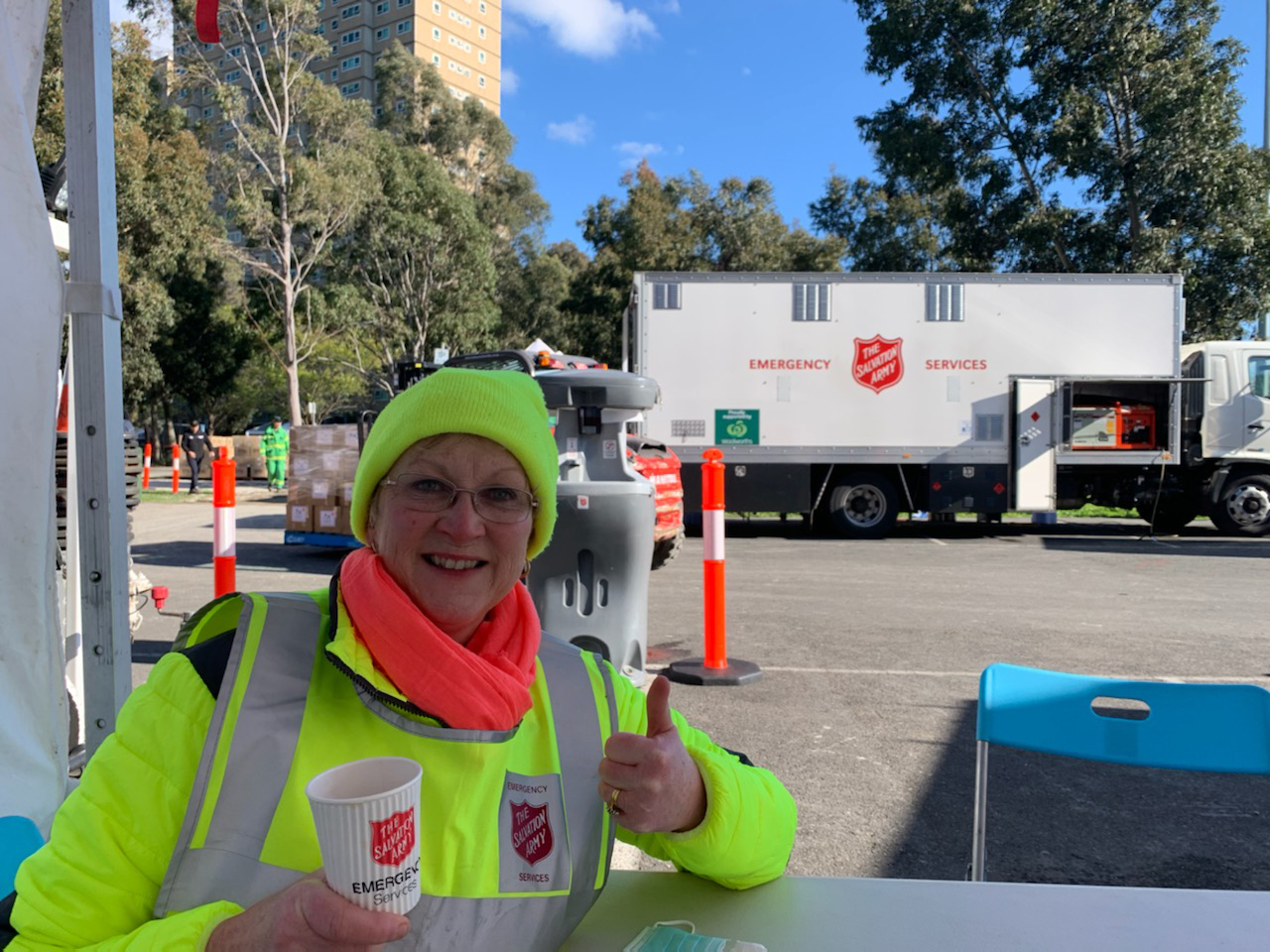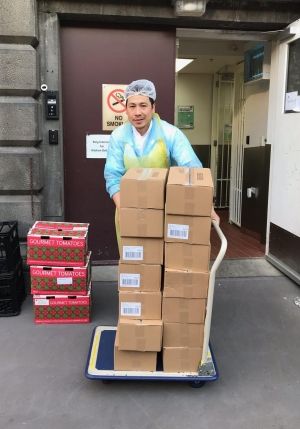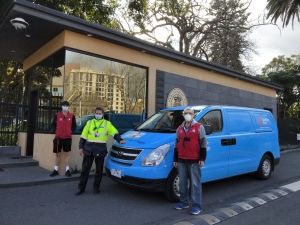Victorian Salvos continue to step up during lockdown

Victorian Salvos continue to step up during lockdown
The Salvation Army is working with the Victorian police department, state government and other services to rally for the state’s most vulnerable and give them the holistic care they need in the second lockdown. (Far right) Majors Brendan and Sandra Nottle, pictured with members of the Project 614 team and Victorian Police on the steps of Parliament House in Melbourne city. All photos courtesy Salvation Army Project 614’s official Facebook page.
As Victorians go through their second COVID-19 lockdown this year, concerns for their physical, mental and spiritual health has been paramount for Salvation Army expressions across the state.
Despite the challenges, Salvation Army officers, staff and volunteers have continually stepped up to serve, with more than a little support from the wider community.
Supporting regional areas
 Volunteer Stella Gibbons from the Sunbury Salvos arm of Salvation Army Emergency Services at Flemington Towers earlier this year. (Photo taken before masks were mandatory.)
Volunteer Stella Gibbons from the Sunbury Salvos arm of Salvation Army Emergency Services at Flemington Towers earlier this year. (Photo taken before masks were mandatory.)
Victorians outside of Melbourne and Mitchell Shire are back in Stage 3 lockdown, meaning they can only go outside for essentials, health care, work and exercise.
Sunbury Salvos, in the state’s north-west, has been meeting the needs of its community by engaging with different forms of technology and partnering with other social services.
“Mental health issues have been coming up especially in the last three months or so,” said Lieutenant Andrew Webb, the Sunbury Corps Officer (pastor). “We are a founding member of the Sunbury Community Relief and Aid Providers network (SCRAP), where we work with local support organisations, housing and homelessness programs, and other community relief organisations, to identify and respond to needs in the area.”
Church members check on how folk are coping when they connect with Doorways clients over the phone and create custom-built care packs with essential needs, which are dispersed in cooperation with the local Rotary club across the region.
With multiple emergencies in the region over the past six months, including the search and rescue of autistic teenager William Callaghan at Mount Disappointment, the Sunbury Salvos team also provides physical and emotional support for Salvation Army Emergency Services (SAES).
Andrew and the corps leadership team have also found ways to care for and connect with every member of the Sunbury Salvos – through text messages, YouTube videos, Zoom catchups and online prayer meetings, creative worship packs, emails and a weekly pastoral phone call.
“We are trying to work on a lot of technical levels to capture people from different age groups,” said Andrew. “We want all people to know they are loved by God and by our corps, especially now.”
Sharing hope in metropolitan Melbourne
 Chef Joe and his team at Parliament House will have cooked up 500,000 meals by this weekend to help Project 614 and other services feed the city’s homeless in hotel accommodation and on the streets.
Chef Joe and his team at Parliament House will have cooked up 500,000 meals by this weekend to help Project 614 and other services feed the city’s homeless in hotel accommodation and on the streets.
In the heart of Melbourne, the team at The Salvation Army’s Project 614 Bourke Street expression are meeting the community’s hunger for a good feed and a chat.
This Sunday, they celebrate 500,000 meals coming out of the Parliament of Victoria kitchens since December, in a Salvo-led initiative to feed the city’s homeless.
The meals are dispersed through a coalition of seven services, including Project 614, which in turn includes the meals in food parcels and as takeaway meals three times a day from the 614 building.
And while people can’t currently meet at the café, Majors Brendan and Sandra Nottle have found a creative solution to keep everyone connected. Last week, they restarted Bourke Street’s Friendship Club over the phone – a club founded by Brigadier Isabel (Bella) Gale that ran for 41 years. “We are offering friendship and connection in a fairly wobbly time,” said Brendan.
The friendship club has the potential to reach up to 2.3 million Australians who currently live alone, and crisis calls will be referred to Lifeline and Beyond Blue. “We are all in the same boat in Melbourne right now, and we don’t want you to be lonely,” said Brendan. “Together we can help build a friendly, positive culture and care for each other during a difficult time.”
 The Salvation Army is part of a state government-wide response in Victoria, ensuring that people experiencing homelessness currently in hotel accommodation are taken care of. Pictured here are volunteers from Project 614 picking up meals from Parliament House. Some will be dispersed to residents across seven locations under the Salvos care.
The Salvation Army is part of a state government-wide response in Victoria, ensuring that people experiencing homelessness currently in hotel accommodation are taken care of. Pictured here are volunteers from Project 614 picking up meals from Parliament House. Some will be dispersed to residents across seven locations under the Salvos care.
Citywide strategy
As Melbournians adjust to Stage 4 restrictions, hotel accommodation for 2000 of the city’s homeless has been extended to April 2021 in a $150 million state government package.
The Salvation Army is a part of the Hotels Homelessness Emergency Response, ensuring that the physical, emotional and spiritual needs of residents are met at five hotels across seven locations.
Major Andrew Craib, who is heading the Salvo contingent with Lisa Sammut, Manager of Salvation Army Homelessness in Metro Melbourne, said their approach has broadened after July’s COVID-19 outbreak at The Towers, where multiple hotels in Melbourne’s Northern suburbs were locked down due to coronavirus.
“As the Department of Health and Human Services (DHHS) were reviewing the approach, they found [guests needed] some wrap-around services, so I see that it has a four-fold approach – Accommodation, Security and Safety, Health and Welfare,” said Andrew.
Aside from ensuring that guests have access to meals (often provided through 614’s partnership with the Parliament kitchens), Salvation Army representatives partner with social workers to connect, or reconnect, people with case managers so they continue to receive long-term care.
The Emergency Response Team also oversee the physical health of guests so they have access to COVID-19 testing, and they are a touchpoint for access to legal, housing, food security and drug and alcohol services.
“[Our response] is really about the total wellbeing of guests who are placed in our care,” said Andrew. “The management and staff of the hotels have been terrific. This response shows how strong the sector is in working together collaboratively for the benefit of our guests”.